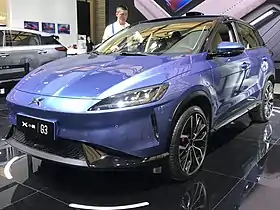XPeng
Xpeng or Xiaopeng Motors (Chinese: 小鹏汽车), also known as XMotors.ai, is a Chinese electric vehicle manufacturer. The company is headquartered in Guangzhou, with offices in Mountain View, California in the US and is publicly traded on the New York Stock Exchange.
| Type | Public | ||||||||||
|---|---|---|---|---|---|---|---|---|---|---|---|
| NYSE: XPEV | |||||||||||
| Industry | Automotive | ||||||||||
| Founded | 2014 | ||||||||||
| Founder | He Xiaopeng Xia Heng He Tao Yang Chunlei[1] | ||||||||||
| Headquarters | Guangzhou, China | ||||||||||
Key people | He Xiaopeng (chairman) Brian Gu Hongdi (vice chairman) | ||||||||||
Number of employees | 3,676 (June 2020)[2] | ||||||||||
| Chinese name | |||||||||||
| Simplified Chinese | 小鹏汽车 | ||||||||||
| Traditional Chinese | 小鵬汽車 | ||||||||||
| |||||||||||
| Website | www | ||||||||||
History
Xpeng was co-founded in 2014 by Henry Xia (Xia Heng) and He Tao, former senior executives at GAC Group with expertise in automotive technology and research and development. Initial backers included: the founder of UCWeb and former Alibaba executive He Xiaopeng (now Chairman of Xpeng), and Lei Jun, the founder of Xiaomi. Prominent Chinese and international investors included Alibaba, Foxconn and IDG Capital. A further funding round in 2018 saw Alibaba's vice president Joseph Tsai join the corporate board of Xpeng.[3][4]
Xpeng's subsidiary in the United States, XMotors.ai held a permit for testing self-driving cars from the California Department of Motor Vehicles starting in September 2018.[5] The permit was revoked in February 2020 due to Xpeng's failure to submit a disengagement report.[6]
Xpeng started production of its first model, the Xpeng G3 SUV, in November 2018.[7] It launched the G3 in December 2018 at the 2018 Consumer Electronics Show in Las Vegas.[8][9]
Its second model, the P7, a four-door electric sedan, premiered in April 2019 at the 2019 Auto Shanghai show[10] and started deliveries to customers in June 2020.[11][12]
In May 2019, Xpeng launched a vehicle for hire company with its own vehicles to serve Guangzhou.[13]
In November 2019, Xpeng raised USD$400 million in a third fundraising round, which saw Xiaomi join as a strategic investor of Xpeng.[14][15] In July 2020, Xpeng raised $500 million from a group of investors including Aspex, Coatue, Hillhouse Capital and Sequoia Capital China.[16] In August 2020, Xpeng raised an additional $400 million from a group of investors including Alibaba, Qatar Investment Authority and Abu Dhabi’s sovereign wealth fund Mubadala. On August 27, 2020, Xpeng raised $1.5 billion with an IPO on the New York Stock Exchange, where its shares climbed more than 40% on the first day of trading.[17]
Controversies
In July 2018, the United States Department of Justice charged an ex-Apple employee for stealing the trade secrets of Apple's autonomous car project in an attempt to get a job at Xpeng.[18][19]
In March 2019, Tesla sued Cao Guangzhi, a former Tesla employee, accusing him of stealing its Autopilot source code and bringing them to Xpeng. Cao denied claims of intellectual property theft, but admitted to uploading Tesla's source code to his iCloud account prior to leaving Tesla while he was still working for Tesla. In response to Tesla's accusations, Xpeng launched an internal investigation and said it “was not aware of any alleged misconduct by Mr. Cao.”.[20] In April 2020, Tesla made new filings in its lawsuit.[21]
References
- Nan, Hua (24 December 2018). "This EV maker caters to young consumers by making driving easier and more fun". CompassList. Retrieved 11 May 2019.
- "Form F-1 XPeng Inc". Securities and Exchange Commission. Retrieved 23 November 2020.
- Lin, Liza (28 January 2018). "Alibaba, Foxconn Invest in Chinese Electric-Vehicle Maker". The Wall Street Journal. Retrieved 8 April 2019.
- "Alibaba, Foxconn lead $350 million funding in electric car startup". Reuters. 29 January 2018. Retrieved 8 April 2019.
- Herger, Mario (5 September 2018). "Xmotors.ai 57th Company With California Test License". The Last Driver License Holder. Retrieved 5 March 2020.
- Shaw, Keith (27 February 2020). "Self-driving vehicles drove nearly 2.9M test miles in California". The Robot Report. Retrieved 5 March 2020.
- "Form F-1, Registration statement under the Securities Act of 1933 for XPeng Inc". www.sec.gov. August 7, 2020. Retrieved 2020-12-01.
- "Xpeng Motors premieres its EV-G3 at 2018 International with 4 prominent attributes to Usher in A new Era of Autonomous Driving Experience" (Press release). Xpeng Motors. 10 January 2018. Retrieved 12 July 2019 – via PR Newswire.
- Vijayenthiran, Viknesh (11 January 2018). "Chinese electric car startup Xpeng shows G3 SUV at 2018 CES". Motor Authority. Retrieved 12 July 2019.
- Xie, Yu (16 April 2019). "Chinese electric vehicle maker Xpeng unveils P7 four-door coupe at Auto Shanghai 2019, months after SUV roll out". South China Morning Post. Retrieved 18 April 2019.
- Blanco, Sebastian. "Xpeng Starts P7 Electric Sedan Deliveries In China, Taking On Tesla". Forbes. Retrieved 2020-08-28.
- Deangelis, Marc. "Xpeng claims its Chinese-made EV can outlast a Model 3". www.engadget.com. Verizon Media. Retrieved 30 November 2020.
- Liao, Rita (May 16, 2019). "China's Tesla wannabe Xpeng starts ride-hailing service". TechCrunch.
- Kharpal, Arjun (13 November 2019). "Chinese Tesla rival Xpeng raises $400 million from investors such as Xiaomi". CNBC. Retrieved 14 November 2019.
- Korosec, Kirsten (13 November 2019). "Chinese EV startup XPeng Motors raises $400 million, takes on Xiaomi as strategic investor". TechCrunch. Retrieved 5 March 2020.
- https://www.cnbc.com/2020/07/20/chinese-tesla-rival-xpeng-motor-raises-500-million.html
- "Xpeng shares soar 41% in US debut, market cap nears Chinese auto giants · TechNode". TechNode. 2020-08-28. Retrieved 2020-08-28.
- Chiu, Allyson (July 11, 2018). "Ex-Apple engineer arrested on his way to China, charged with stealing company's autonomous car secrets". The Washington Post. ISSN 0190-8286. Retrieved 2020-12-03.
- "Former Apple Employee Indicted On Theft Of Trade Secrets". U.S. Department of Justice. July 16, 2018. Retrieved 2020-12-03.
- O'Kane, Sean (10 July 2019). "Former Tesla employee admits uploading Autopilot source code to his iCloud". The Verge. Retrieved 12 July 2019.
- "Tesla doubles down on claim Chinese EV startup stole its Autopilot source code". Electrek. 27 April 2020. Retrieved 4 October 2020.



